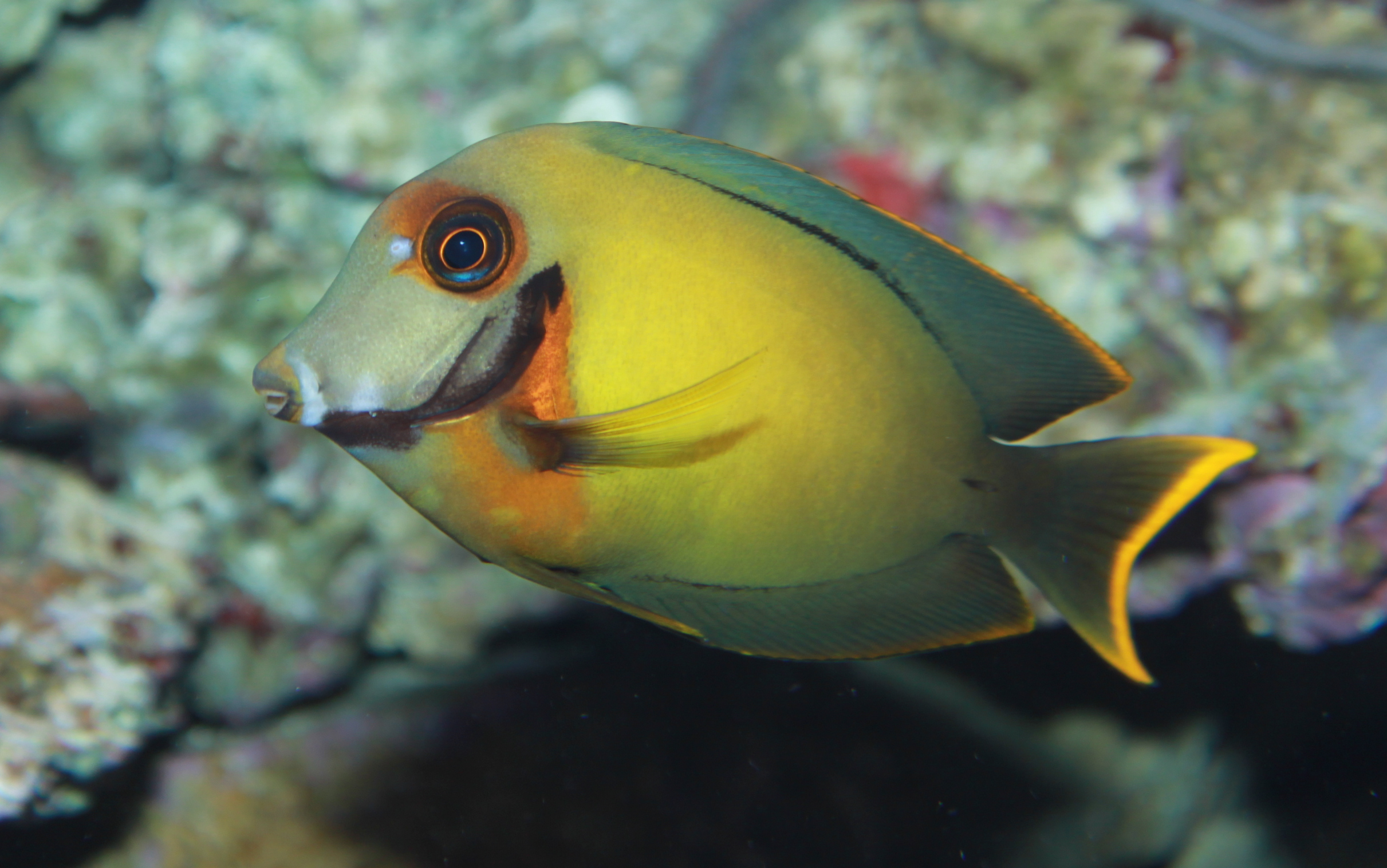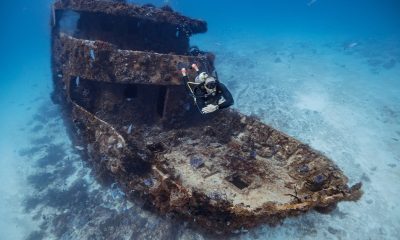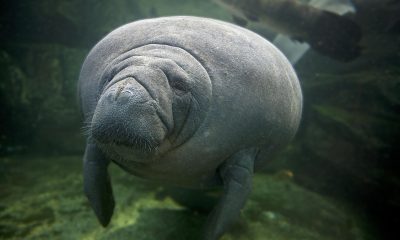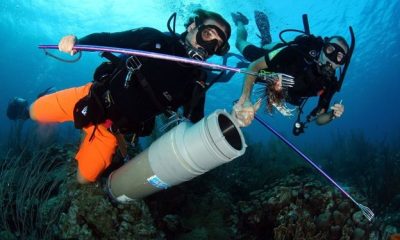News
Scuba divers ‘avert ecological disaster’ by removing invasive species from Florida waters

Two Florida scuba divers who were on a dive beneath Palm Beach County’s Blue Heron Bridge during the Thanksgiving holiday spotted a bright yellow fish approximately four inches long that they had never seen before.
Although some divers might have just admired it, taken a photo and kept on swimming, Deb Devers and Lureen Ferretti reported it to the Reef Environmental Education Foundation (REEF) — a Key Largo-based non-profit organization that serves as a regional clearinghouse for control of exotic marine fish species.
“They weren’t sure what it was, but they knew it was something that doesn’t belong here,” said Las Akins, director of special projects for REEF.
Akins said their instincts were correct: the fish was a mimic lemon peel surgeonfish, also known as a chocolate surgeonfish, native to the Indo-Pacific and the first of its kind documented in Florida waters. Devers kept track of the fish, and last month, she and Akins captured it alive using hand nets. It was sent to the Ripley’s Aquarium of Canada to be displayed as an educational tool on the hazards of invasive species.
Akins said the removal might have averted an ecological disaster similar to the spread of lionfish — another Indo-Pacific invader now well-established in the Western Atlantic, Gulf of Mexico and Caribbean. Lionfish — first sighted off Dania Beach in 1985 and believed to be an abandoned aquarium pet — have been blamed for wiping some local reef systems clean of native tropical fish.
“We don’t know what the effects would have been if the fish had become established and began reproducing,” said Akins. “But if we wait to find out, then it’s too late.”
According to REEF, taking out the surgeonfish was the third successful preemptive strike against a non-native marine fish species in Florida coastal waters.
In 1999 and 2002, REEF staff and volunteers captured four large Indo-Pacific batfish from Molasses Reef in Key Largo. In 2009, they removed a whitetail dascyllus damselfish from the east side of the Blue Heron Bridge. In 2012, Miami divers Greg Caterino and Wayne Grammes speared an exotic humpback grouper on a reef off Biscayne National Park and turned the carcass over to REEF. Akins said none of those three species are known to have reappeared in Florida waters since their removals.
“Some people might say, ‘Oh big deal, we took this little fish out of the water,’” Akins said. “But that’s the way the lionfish got started. If only we could have taken the first few lionfish out of the water in the first place. We’re relying on divers, snorkelers and fishermen to be our eyes and ears on the water. It’s a perfect example of how early detection and rapid removal can be successful in stemming an invasion.”
Releasing non-native fish into Florida waters not only is harmful, but also illegal. The Florida Fish and Wildlife Conservation Commission encourages pet owners who need to find new homes for their fish or other exotic animals to call the FWC’s Exotic Species Hotline at 1-888-IveGot1.
Anyone who spots a strange-looking fish that they suspect is invasive is advised to take a photo and report the sighting at reef.org.
Gear News
Introducing the TR-80, IR-50 and CS-30 Regulators from DYNAMICNORD

Whether you are a beginner or a professional diver – with the three new main regulators from DYNAMICNORD, everyone will find their favourite regulator. They all look super stylish.
Excellent performance with the TR-80
Quality and performance are the be-all and end-all for regulators. It is not for nothing that the TR stands for Tec Reg. The innovative design of the TR-80 guarantees absolute reliability – even in ice-cold waters.

Perfect breathing effort at 0.8 J/l / certified for diving in waters below 10 degrees / structural design made of solid brass for best cold protection / membrane-compensated design with dry seal of the first stage / reduced exhalation effort thanks to optimized exhalation membrane and bubble deflector / adjustable Venturi (dive/predive) and adjustment knob for individual inhalation comfort / innovative design of the front cover prevents free-flow in strong currents or when diving with scooters / design made of sandblasted brass, matt chrome finish / 2 HP and 4 LP outlets / mouthpiece made of high-quality, anti-allergic silicone for maximum comfort.


Amazing underwater adventures with the IR-50
The IR-50 is the top regulator for advanced and experienced divers. Natural breathing is the essence of this regulator.

Ideal breathing effort at 0.8 J/l /certified for diving in waters below 10 degrees / compensated membrane / adjustable venturi (dive/predive) and adjustment knob for individual inhalation comfort/ outlet valve and deflector for minimum exhalation effort and reduction of bubbles on the face / design made of sandblasted brass, matt chrome finish / 2 HP and 4 NP outlets / mouthpiece made of high-quality, anti-allergic silicone for maximum comfort.


The Workhorse – our CS-30
For diving centres and diving beginners – the workhorse stands for strong construction, reliability and robustness. Perfect for your training.

Optimal breathing effort at 0.8 J/l /recommended for diving in waters above 10 degrees / non-compensated piston / adjustable venturi (dive/predive) / outlet valve and deflector for minimum exhalation effort and reduction of bubbles on the face / design made of sandblasted brass, matt chrome finish / 1 HP and 3 NP outlets / mouthpiece made of high-quality, anti-allergic silicone for maximum comfort.


Octopus OP-30
The OP-30 is the ideal addition to all DYNAMICNORD regulators. It is identical in construction to the CS-30.

The TR-80, IR-50, CS-30 (DIN & INT) regulators and the Octopus OP-30 are available from DYNAMICNORD dealers and in the online store.
DYNAMICNORD – Your Outdoor Companion.
Marine Life & Conservation
Paul Watson Released as Denmark Blocks Japan’s Extradition Bid

Renowned anti-whaling activist Paul Watson has been released from custody in Greenland after spending five months in detention. Denmark’s Justice Ministry rejected Japan’s request for his extradition, citing insufficient guarantees that his time already served in custody would be credited against any potential sentence.
The 74-year-old Canadian-American was arrested on July 21 in Nuuk, Greenland’s capital, when his ship docked to refuel. His arrest was based on a 2012 Japanese warrant related to a 2010 encounter in Antarctic waters. Japan alleged Watson obstructed operations and caused damage to a whaling research ship during efforts to disrupt illegal whaling. Watson has consistently denied these claims, maintaining his commitment to marine conservation.
Denmark, which oversees extradition matters for Greenland, concluded that while the legal conditions for extradition were met, the lack of assurances from Japan regarding time-served credit made extradition untenable.
In a video shared by his foundation, Watson expressed gratitude and relief, saying, “After five months, it’s good to be out… and good to know they’re not sending me to Japan.” He added that the most difficult part of his time in custody was being separated from his two young sons.
Watson is a pioneering figure in marine conservation, known for founding the Captain Paul Watson Foundation in 2022 after decades of activism with the Sea Shepherd Conservation Society. His bold efforts to defend marine life have earned him widespread support, including from celebrities and conservationists. His work has also been featured in the acclaimed reality TV series Whale Wars.
Watson’s lawyer, Jonas Christoffersen, praised the decision, stating, “We are happy and relieved that Paul Watson is now free.” He added that Watson is eager to reunite with his family and continue his vital work.
The arrest occurred while Watson’s vessel, the M/Y John Paul DeJoria, was en route to the North Pacific with a team of 26 volunteers to intercept a Japanese whaling ship. His foundation described the arrest as politically motivated and emphasized that Watson’s actions were focused on ending illegal whaling practices.
Japan resumed commercial whaling in 2019 after leaving the International Whaling Commission, asserting that whale meat is a cultural tradition. Conservationists, however, continue to challenge these practices, highlighting their impact on marine ecosystems.
Despite the challenges, Watson remains steadfast in his mission to protect marine life and bring attention to whaling practices. His dedication to ocean conservation has made him a globally respected advocate for the environment.
-

 News2 months ago
News2 months agoIconic SS United States to become the World’s Largest Artificial Reef
-

 News3 months ago
News3 months agoBook Review – 52 Assignments: Underwater Photography
-

 Gear News3 months ago
Gear News3 months agoDYNAMICNORD – New German diving brand enters the British market
-

 News3 months ago
News3 months agoExploring Cenote El Pit: A Diver’s Dream
-

 Gear News3 months ago
Gear News3 months agoTry BARE drysuits (and maybe even win one!) this Friday with Sea & Sea at North West Dive Fest
-

 Marine Life & Conservation3 months ago
Marine Life & Conservation3 months agoBook Review: Coral Triangle Cameos
-

 Blogs2 months ago
Blogs2 months agoDive the Egyptian Red Sea this Autumn with Regaldive
-

 News3 months ago
News3 months ago2024 Ocean Art Underwater Photo Competition Announced













